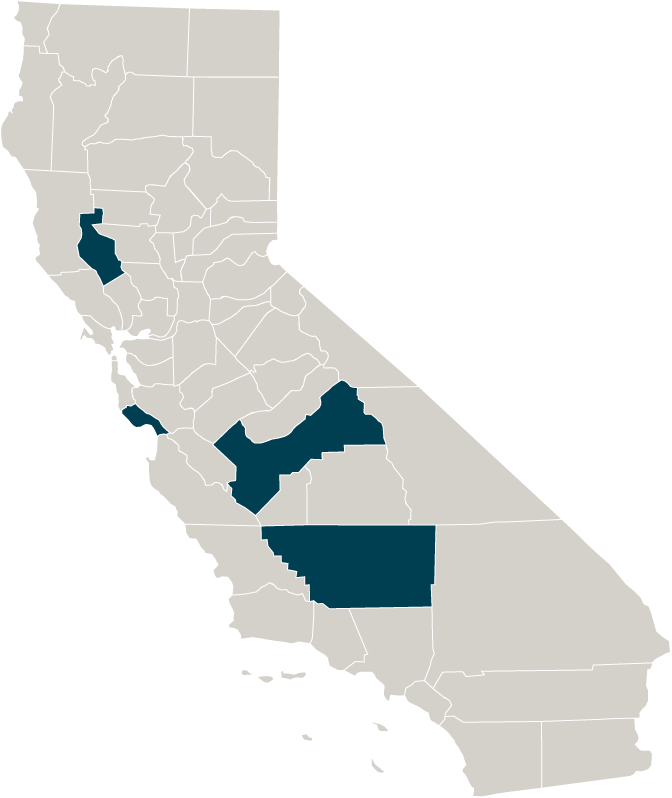Strike Four, now what? ACLU sues Kern County, California for systemically denying counsel

In a lawsuit filed against Kern County last week, the ACLU alleges constitutional violations at the arraignment where probation officers offer plea deals to unrepresented defendants and encourage them to waive counsel in a process that is closed to the public. If true, Kern County would be the fourth California county exposed for systemically denying people the right to counsel, and the state has no way of knowing whether there are more.
The ACLU complaint provides data showing that between 2015 and 2023, fewer than 5% of misdemeanor defendants in Kern County were represented by counsel at arraignment and approximately 50,000 people pled guilty to a misdemeanor without counsel. Many of the unrepresented were indigent, some were sentenced to jail, and some were eventually sent to immigration detention.
6AC takes no position on whether the allegations in the ACLU complaint are true. But if they are, it begs the question: how many other courtrooms and counties across California wrongfully deny people counsel? California has no way of knowing.
A “fast-track plea system” with no judge, prosecutor, or counsel
The ACLU complaint alleges the following events at the arraignment proceeding in Kern County courts, defined by closed-door processing:
The bailiffs and probation officers ask members of the public to leave the courtroom and prevent them from entering. Court officials then play a dated video of a retired judge and retired chief public defender providing a “statement of rights” to the group of unrepresented in-custody and out-of-custody defendants. According to the complaint, the video is not individualized, uses legal jargon, is legally inaccurate, and discourages defendants from requesting counsel. The retired judge advises that all misdemeanor defendants have a right to counsel but exercising that right could delay arraignment. The retired judge and retired chief public defender further incorrectly advise that a defendant may have to pay “between $100 and $500” in fees for services received by appointed counsel.
After playing the video, probation officers meet with defendants to inform them of their charges and present plea offers. This occurs without a judge, prosecutor, or defense counsel present and out of the view of the public. The probation officer provides the unrepresented defendant with a one-page summary waiver of counsel and trial rights form to initial and sign, which does not provide an indication that the defendant understood the rights being waived.
Once unrepresented defendants go through this waiver, the courtroom doors open to the public and the judge takes the bench. The judge then arraigns the defendants, sometimes individually and sometimes in groups. Having signed the waiver form, many defendants formally enter a guilty plea and are sentenced on the spot.
The complaint alleges that this process discriminates against defendants with mental disabilities (some of whom may be legally incompetent to stand trial) and limited English proficiency, disproportionately impacts Black and Latinx defendants, and results in serious immigration consequences.
The fault lines in California’s indigent defense system are starting to show
Kern County is the fourth county in California exposed for denying people their right to counsel. The ACLU sued and reached a settlement agreement in Fresno County (2020), and 6AC evaluated and published reports in Santa Cruz County (2020) and Lake County (2023). One by one, the damage inflicted by systemically denying counsel in each county was revealed to the state, and together these counties encompass wide-ranging demographics, economies, poverty rates, and geographic regions in California.

Map of California, highlighting Fresno, Kern, Lake, and Santa Cruz counties.
The fault lines in California’s indigent defense system run long and deep, and are starting to show. Yet, the state has no way of knowing the magnitude. California remains one of only seven states to delegate its entire constitutional right to counsel obligations to local governments while having no state infrastructure to oversee local indigent defense services. The state ranks 48th in the country for its proportion of funding contribution, with counties shouldering over 95% of the state’s total indigent defense costs.
The harms caused by wrongfully denying people counsel do not remain siloed in each county. An unrepresented defendant anywhere in the state is vulnerable everywhere in the state: an uncounseled misdemeanor guilty plea in one county can trigger a charge enhancement in any other county. The epicenter of the right to counsel is the state government – it is a state constitutional obligation with statewide implications that impact millions of people across California.
Other states that were, and are no longer, in California’s shoes accepted their right to counsel responsibilities by creating a state government-level task force to bring stakeholders together, understand the extent of their problem, and develop legislative solutions tailored to their state’s unique needs. Regardless of how California chooses to address the magnitude of its fault lines, the state must address it. And when it does, 6AC stands ready to assist.


